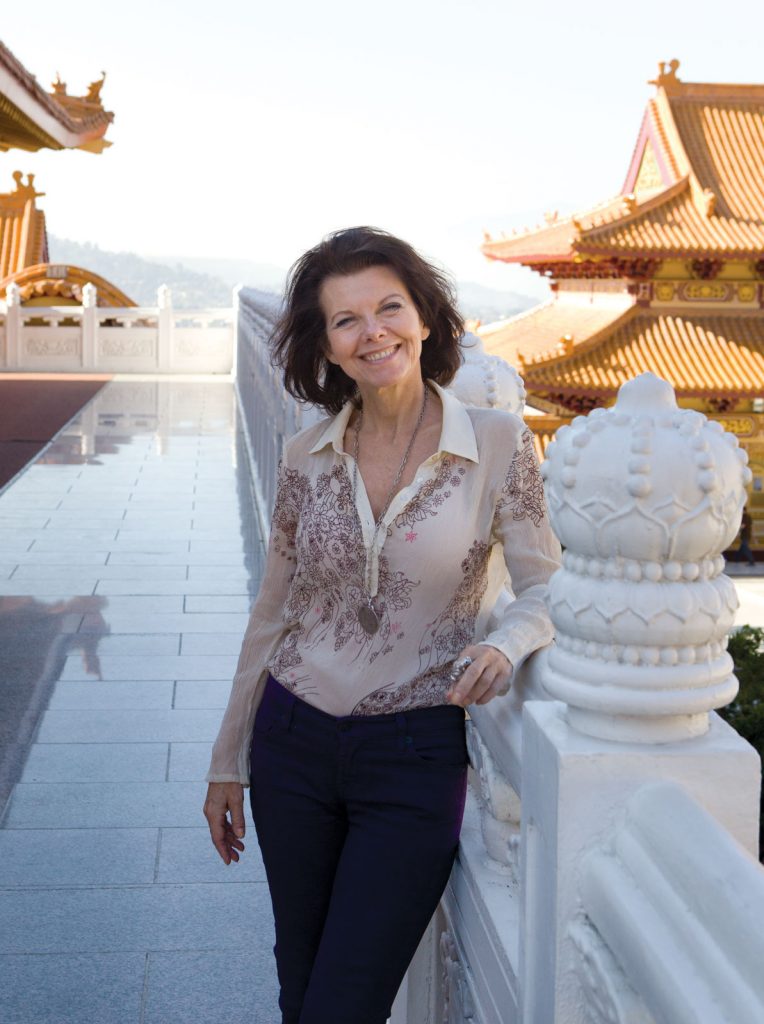Age: 51
Profession: Writer
Location: Los Angeles, CA
You’ve said that your childhood and your father’s gambling started you on the Buddha Path.When I was a child, my family often moved. After we would settle down in a city, a year would go by, and I would accumulate stuff. In Paris I once assembled a marvelous collection of dolls of all countries and historical epochs. They were works of art—and costly, too. Then we would leave, but only “for a couple of months,” which usually had something to do with my father’s gambling losses. By the time we returned, either my father would have forgotten to pay the storage, or he couldn’t remember where the storage was—that actually happened, in London! We moved eight to ten times during my childhood, and the cycle of feelings is still fresh in my memory. At first I cried incessantly. I wanted to have my stuff! It seemed important to have it, and its absence had a life of its own. The second time, I was angry; the third time I was no longer surprised. And then it finally crept up on me that I really didn’t care that much: it was clear that the absence of all those things had no real impact. For the rest of my life, stuff came and went. I was even able to get through robberies. Don’t misunderstand me—I’m grateful to the universe, to the great Life Force, for art, and I enjoy beautiful things, but the need to possess them is not a driving factor. The same applies to homes. I vagabond endlessly, feeling sufficiently at home in many places, but always with a degree of detachment.
What attracted you to the Buddha, the person? That is the leitmotif question. The simplicity of his words. The serenity of his smile. I loved all the statues of Buddha I saw and was captivated by that smile. It was like an eagle that soars far above all the problems, the pettiness, the foolishness—as if the distance dramatically reveals the beauty of life and the absurdity of egoism. Also, my mother told me stories of the Dalai Lama when I was 4 years old, about the ways of Buddhist monks, about Zen archery, and it all pointed to one thing: that the interior life, what we have inside, is as powerful and fascinating as the exterior, if not more so—so there began the interest to dive inward and explore the relationship between the interior and the exterior.
How did you go about “harnessing” the Buddha character? There was an affinity. I could identify with his moves—picking up and leaving to search. I knew that something had happened, something profoundly painful and significant that provoked his decision, and I was curious to find out what that was.
What prompted you to write a novel about the life of Siddhartha Gautama? Many books have been written about what others think he said or thought or wanted to say, or how he was understood—and many others [written] on his teachings—but often they are written in a manner that does not make for easy reading. Furthermore, his life was very much a mystery, as words were registered by lore but a person’s actions were not. I wanted to write about who I felt him to be, based on the documents I read and the revealing research by Professor André Bareau [now deceased] of the Collège de France. The story I came across was so rich in substance and adventure and characters and life that I knew there was a way to narrate his life and philosophy, a way to make him accessible, interesting, and comprehensible to the public, and historically the background canvas was all a writer desires: the Silk Road, religious and cultural diversity, economic growth, political ambition.
Do you see examples of Buddha’s teachings being brought to life in contemporary media? There was an episode of Star Trek: Deep Space Nine that I found riveting: when the starship arrives at the planet of the Changelings, the planet is a mass of water-like substance, and as the Changeling character on DS9 goes “home” and immerses himself in the water, he becomes water and sheds his identity. Yet when he resurfaces, he re-becomes that identity, and we know there was no suffering from loss of ego.
What were the greatest obstacles you faced writing Siddhartha: The Warrior Prince? While it was relatively easy to detach myself from objects, it wasn’t quite the same when it came to the intangible possessions. Writing has been my means of expression: my books and scripts are my babies. When events turned against me during the writing and my backer decided to withdraw, that caused the first meltdown. So I had to let it go the first time. I thought, “This is much more painful than losing an apartment,” as I sat on a small bridge in a Tokyo garden and watched the water flow underneath. The project came back—and demanded to be finalized. So I picked it back up warily, as much pain had already been endured. Then it happened a second time. This time the obstacle wore an artistic face: Bertolucci announced his film Little Buddha. I went through the separation process once more, but it was easier, and I learned to turn it around and make the best of it. Instead of insisting on the script, I wrote the book. Once it was completed and published, I was satisfied. The obstacles changed my goal and pushed me to do more, deliver more, and, in retrospect, a deeper understanding resulted.
Thank you for subscribing to Tricycle! As a nonprofit, we depend on readers like you to keep Buddhist teachings and practices widely available.
